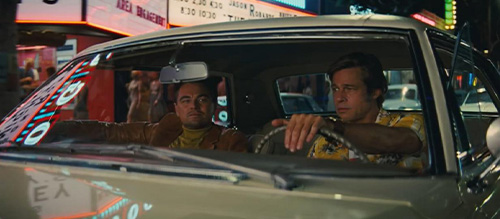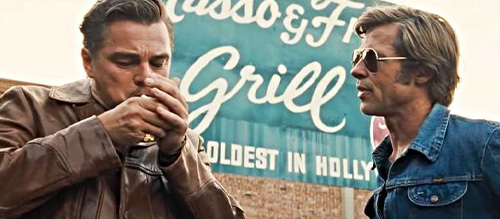Once Upon a Time… in Hollywood (2019) Review
Once Upon a Time… In Hollywood (2019)
Director: Quentin Tarantino
Screenwriter: Quentin Tarantino
Starring: Leonardo DiCaprio, Brad Pitt, Margot Robbie, Emile Hirsch, Margaret Qualley, Timothy Olyphant, Julia Butters, Austin Butler, Dakota Fanning, Bruce Dern, Mike Moh, Al Pacino, Luke Perry, Damian Lewis, Kurt Russell, Lena Dunham, Maya Hawke, Michael Madsen
Quentin Tarantino’s long awaited 9th entry into his critically beloved directorial filmography is every bit as reminiscent of great films as his other worldwide hits are, yet with Once Upon a Time… in Hollywood, the director seems to have crossed a boundary from loyal homage to self parody, this latest effort being equally an act of self-reference as it is an exploration of the filmmaker’s own ego. If the Tarantino-verse was ever a thing, this is a movie about that universe, not one set in it.
The director’s latest release was described by film critic Mark Kermode on Twitter as “one part quintessential Quentin to three parts ‘Once Upon a Time in A-“meh”-rica.’,” with this take being bang on the money.
Once Upon a Time… in Hollywood looks like movies of years and decades past and it runs smooth like a Tarantino movie always does, but it also holds a distinct lack of narrative momentum through parts of the movie that seem to be established only to serve the director’s own aspirations of fulfilling artistic tribute to those who’ve inspired his own work over the years; tributes that take the original material and soak it in a Tarantino sponge until the modern auteur has full ownership over it, the very artists he admires becoming fodder for his own egotistical exploration of their work, their use as instruments in a self-referencing narrative removing their context and reassigning it to the screenwriter/director’s own political, almost fourth-wall breaking stance.
For the first time in Tarantino’s career, one of his releases has felt removed from its intention of putting the story first, the director’s latest efforts at some stages only working for those familiar with his work and his behind-the-scenes politics, beliefs, trials and tribulations. In fact, the very best moment of the film (which itself has proven to be divisive in recent weeks and months) is the filmmaker’s in-your-face response to recent criticisms regarding his use of violence, particularly that of violence towards women, and the defiance he shows to critics in a rip-roaring finale that is some of the director’s best ever work. Its inclusion, however, does emphasise the issue at hand; that to enjoy Once Upon a Time… in Hollywood, one must not only understand where the filmmaker gathers inspiration, but must more importantly understand the director’s very loud voice, both as a filmmaker and as a human being, the latter being distinctly harder to establish for anyone relatively unfamiliar with the man or with film as an industry.
Indeed, there are many moments in the movie where Tarantino quite literally points a finger at his own cinematic tropes, the bright flashing lights of self-homage blurring the otherwise beautifully, classically shot aesthetic of a film that looks like simply no other. Should it have been Tarantino’s intention to wave goodbye to the industry with one self-analytical look at himself, it seems the director may have lost his final assignment’s focus, the throughline of the much more interesting and powerful Charlie Manson murders narrative lost to indulgence.
Ironically, Once Upon a Time… in America doesn’t feature a cameo from the director himself, nor routine appearances from Tarantino regulars Tim Roth and Samuel L. Jackson. Instead, the filmmaker develops the story around two of his most successful leading men from movies this century, Django Unchained star Leonardo DiCaprio and Inglourious Basterds star Brad Pitt, with each man being given the freedom to create interesting characters worthy of investment, DiCaprio even being allowed the rare opportunity to improvise an outburst for what was one of the film’s most raw and insightful scenes.
Both DiCaprio and co-star Pitt offer stellar work, their bond at the heart of the film coming across as legitimate and hearty. In almost every way, Once Upon a Time… in Hollywood is more a buddy movie than it is about the Manson murders, Tarantino borrowing beats and tropes from Hollywood’s Western factory to dig the pallyness into a deep pit of Western-like tension, the result meeting expectations as being both tense and offering catharsis, even through moments of self-indulgent downtime.
The Manson murders, and even the inclusion of Charlie Manson himself, are included for the same reason, the screenwriter-director taking the Basterds approach of re-telling history in a manner that suits the popular consensus, his work in this case partnering the Manson Family’s acts and defining mentality with those of Tarantino’s creative opposition, the very people who attack the filmmaker for being the root cause of violent teenagers and/or encouraging racist or sexist behaviour.
As problematic as this point is, and it most certainly is problematic, there remains a level of respect that Tarantino requires for offering such a bold and frankly cinematic statement of defiance, and even more respect for how he leads his band of merry men and women into the firing line. DiCaprio, himself a problematic figure to some portions of the audience, clearly believes in the project, as does Pitt on the cusp of his acting career’s resurgence. Everyone seems invested, and Tarantino rightfully celebrates it on the screen, grounding his flashy, nostalgic Hollywood take in the real personalities portrayed by his phenomenally talented cast.
As a 2 hour movie, Once Upon a Time… in Hollywood may have been a much more sleek effort, the phenomenal photography and strong narrative base potentially freed of the filmmaker’s insistence upon barking as loudly as possible. But, it wasn’t a 2 hour movie, it was 2 hours and 41 minutes (sleek in comparison to the original 4 and a half hour original final edit), and the result was one of disjointedness, a lack of emotional impact or interest in some sections of the film, and perhaps the first of the director’s films to feel overly long.
Though everything about Once Upon a Time… in Hollywood screams of a traditional form of cinema that will likely be analysed over and over again in film school for the next 100 years, and though in a lot of its aspects – visual, performance, base narrative, editing techniques during times of tension, etc. – the film excels in offering something quite remarkable, this Tarantino release is the most Tarantino of all of his releases for better or worse.
It is said that once a genre begins to include movies of self-parody, the genre has already become tiresome. Willfully or not, through paying self-indulgent homage to himself, Quentin Tarantino has finally offered something resembling his first self-parody; an effort that seems to lack the focus of his all-time great earlier works and is instead, perhaps, the precise moment we can pinpoint as Tarantino signing his career’s own death warrant.
Score: 15/24



